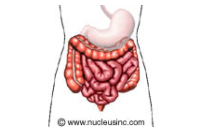- Phone: 310.453.1786 | Fax: 310.584.9992
Inguinal Hernia
What is an inguinal hernia?
An inguinal hernia (say "IN-gwuh-nul HER-nee-uh") occurs when tissue pushes through a weak spot in your groin muscle. This causes a bulge in the groin or scrotum. The bulge may hurt or burn.
See a picture of an inguinal hernia .
What causes an inguinal hernia?
Most inguinal hernias happen because an opening in the muscle wall does not close as it should before birth. That leaves a weak area in the belly muscle. Pressure on that area can cause tissue to push through and bulge out. A hernia can occur soon after birth or much later in life.
You are more likely to get a hernia if you are overweight or you do a lot of lifting, coughing, or straining. Hernias are more common in men. A woman may get a hernia while she is pregnant because of the pressure on her belly wall.
What are the symptoms?
The main symptom of an inguinal hernia is a bulge in the groin or scrotum. It often feels like a round lump. The bulge may form over a period of weeks or months. Or it may appear all of a sudden after you have been lifting heavy weights, coughing, bending, straining, or laughing. The hernia may be painful, but some hernias cause a bulge without pain.
A hernia also may cause swelling and a feeling of heaviness, tugging, or burning in the area of the hernia. These symptoms may get better when you lie down.
Sudden pain, nausea, and vomiting are signs that a part of your intestine may have become trapped in the hernia. Call your doctor if you have a hernia and have these symptoms.
How is an inguinal hernia diagnosed?
A doctor can usually know if you have a hernia based on your symptoms and a physical exam. The bulge is usually easy to feel.
How is it treated?
If you have a hernia, it will not heal on its own. Surgery is the only way to treat a hernia.
If your hernia does not bother you, you most likely can wait to have surgery. Your hernia may get worse, but it may not. In some cases, hernias that are small and painless may never need to be repaired.
Most people with hernias have surgery to repair them, even if they do not have symptoms. This is because many doctors believe surgery is less dangerous than strangulation , a serious problem that occurs when part of your intestine gets trapped inside the hernia.
But you may not need surgery right away. If the hernia is small and painless and you can push it back into your belly, you may be able to wait.
Babies and young children are more likely to have tissue get trapped in a hernia. If your child has a hernia, he or she will need surgery to repair it.


